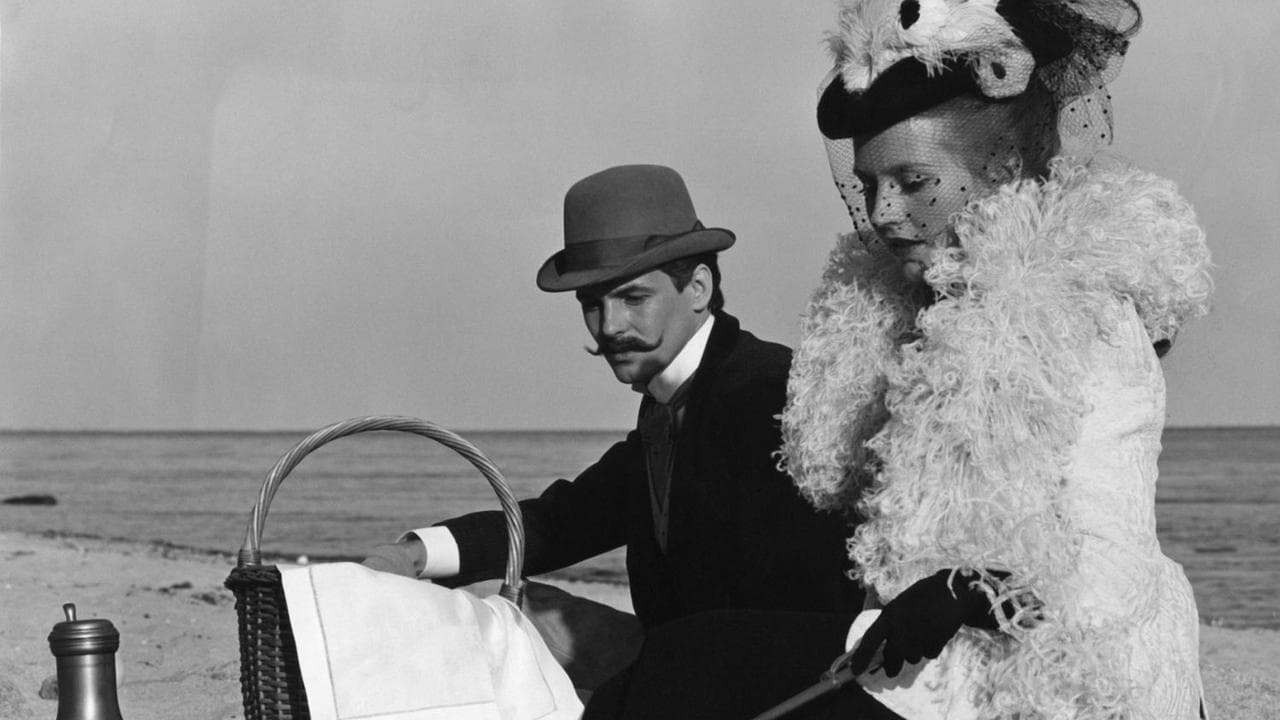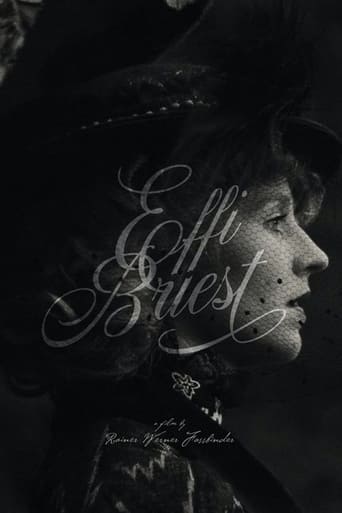

Such a frustrating disappointment
... View MoreThe movie is made so realistic it has a lot of that WoW feeling at the right moments and never tooo over the top. the suspense is done so well and the emotion is felt. Very well put together with the music and all.
... View MoreIt is encouraging that the film ends so strongly.Otherwise, it wouldn't have been a particularly memorable film
... View MoreThrough painfully honest and emotional moments, the movie becomes irresistibly relatable
... View More"Fontane Effi Briest" is a West German movie from the year 1974 and the writer and director is Rainer Werner Fassbinder, although the writer of the original work is of course Theodor Fontane as the title already tells us. It is not one of Fassbinder's earliest works, but he still decided to pick the black-and-white route again, maybe to show how old this story already is. At 140 minutes, it is easily among Fassbinder's longest films. And that's really a negative deal-breaker here. To me, this film dragged a whole lot on many many occasions. I hardly cared for Effi or any of the supporting characters at all as a consequence. And I also really hated the dialogues sometimes. Of course, they were adapted with the exact quotes from Fontane's novel I guess, but I did not like it at all. I usually like Fassbinder when he gives us his view on society or just on how people act within the boundaries of society. There are a handful films from him I really love and some I do not care about particularly, but this one here is really a major disappointment. It is probably my least favorite work from him and it's also not helping that he several actors that appear frequently in his films such as Schygulla, Lommel, Hermann and Böhm. I may be a bit biased as I did not like the recent version starring Julia Jentsch either, but I really only recommend this to huge fans of the Fontane work. Everybody else (even Fassbinder fans) will probably be majorly bored, because it's so different compared to everything else he has done, apart from the very slowly-moving plot. I can only shake my head at other reviewers who call this one of the best films ever made and give it 10 out of 10 stars. Highly not recommended.
... View MoreOne the tablets used by Fassbinder in this movie (the same method he shall use 6 years later in "Berlin Alexanerplatz") shows the text: "He put her under pressure wherever he could. So-to-say a calculus of fear" (Fontane). As any other calculi, also the calculus of fear consists of theorems. Speaking about the relationship between Von Instetten and Effi, we have: 1. Never treat her without menacing, but do not show the menace open, so that you can deny it after. 2. Isolate her from society, best make her a child as soon as possible so that she does not get bored. 3. Never praise her for what she is doing, unless in the presence of foreigners. 4. Praise her in front of her parents with whom you should establish a good friendship. If she is complaining later about her marriage, the guilt will be given to her.As the sub-title of the movie says (the longest ever used in a movie): The movie is about those people who are capable to see the unjustness of social rules but don't help changing them, and by doing so, confirm them. "Effi Briest" is therefore a typical Fassbinder movie which he liked to call "melodramas" and thus also a predecessor of his later "women-movies" about Maria Braun, Lola, Lili Marleen and Veronika Voss.That this film is an outstanding masterpiece has nowadays been recognized by all leading film experts around the world. Although Fassbinder let himself sometimes inspire by works of literature, Fontane's "Effi Briest" is one of his only three explicit literature adaptations, besides "Berlin Alexanderplatz" and "Querelle". One could perhaps go as far and say: While in "Effi Briest", society is criticized at the hand of one single, individual fate, in "Berlin Alexanderplatz" a society as a whole is put in the pillory, and in "Querelle" a possible alternative world after all the disgust is shown. Fassbinder made this long way in societal criticism in only eight years, during which he approached the society of the time in which he lived, by systematically coming closer to reach the 50ies of the 20th century (Lola). His movies can be seen as chronicles of different means of suppression by using calculi which turn out to be independent of time.
... View MoreExquisite black-and-white photography, gorgeous costumes, stunning landscapes, and actors photographed in mirrors and through laced-curtains are the highlights of this emotionally distant film. It is true, however, that the leading actress has her cathartic scene, but it comes late in the film. Too late to really make one care about the spoiled, rich young lady. But this is Fassbinder, and Fassbinder is always watchable, even at his most pretentious. One joy of this film is the presence of Irm Hermann, who can do more with one glare (she doesn't need dialogue as "The Bitter Tears of Petra Von Kant" proved for all time) then any actor I can think of. Schygulla and the other actors are mostly wooden. The beauty of the scene with the starkly handsome Lommel as the rich major and Schygulla picnicking at the beach makes one forgive the shortcomings of the film.
... View MoreWhen reviewing an ordinary film (like Jurassic Park) It is customary to note if the film is not particularly "cinematic". This would then mean that the film in question wouldn't have flashy tracking shots, groovy camera angles, fast paced editing and so on. If these are considered to be good qualities in a film then Effi Briest surely is a bad film.But what if from the beginning the film was meant to be like this? Fassbinder has chosen to hide his work in order to bring forth the original book Effi Briest is based on. To do an adaptation of a text he obviously liked a lot can't have been an easy task to a filmmaker who never relied on existing models of filmmaking. Considering that, one must view Effi Briest as an attempt to create a film as faithful as possible to the original.The result, however, is not alltogether satisfying because most of us will interpret it through a framework of "watching a film". And it must be noted that as a film Effi Briest is slowgoing, static (as is to be expected) and dramatically flat. This could be perhaps a result of a Brechtian device of Fassbinder's to prevent the audience from sinking into the plot (which in itself would be a fine starting point for a soap)but what difference does it make if the film is unwatchable.
... View More